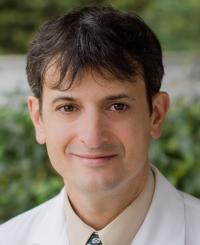Robert Blelloch, MD, PhD

Robert Blelloch, MD, PhD
Education
Biography
Dr. Robert Blelloch received his MD and PhD degrees from the University of Wisconsin-Madison. While studying for his PhD under the mentorship of Judith Kimble, PhD he discovered a novel matrix metalloproteinase, which is essential for normal gonad morphogenesis in the C. elegans nematode. After earning his dual degree, Blelloch completed a residency in clinical pathology followed by a fellowship in transfusion medicine at Brigham and Women’s Hospital. During his residency and fellowship Blelloch concurrently conducted research at the Whitehead Institute of Biomedical Research under the mentorship of Rudolf Jaenisch, MD. Through this research, Blelloch developed an interest in the epigenetic regulation of normal development and disease. In particular, he used somatic cell nuclear transfer (SCNT) to globally evaluate the role of epigenetics in cancer. This approach enabled him to show a critical, although variable, role for epigenetics in tumor development and maintenance. He also used SCNT to show a role for global DNA methylation in the maintenance of cellular differentiation.
Since starting his own lab in 2006, Blelloch continues to follow his interest in the global regulators of cellular differentiation and cancer. His work is focused on the role of small noncoding RNAs in stem cell regulation and prostate cancer. Blelloch's ultimate goal is to develop a deeper understanding of the molecular underpinnings of normal and abnormal cell differentiation which will contribute to the advancement of regenerative medicine and cancer care.
Blelloch is a professor in three departments: Urology; Obstetrics, Gynecology and Reproductive Sciences; and Pathology. He holds the Peter R. Carroll, MD Endowed Chair in Urology. Blelloch is a member of the Eli and Edythe Broad Center of Regeneration Medicine and Stem Cell Research, the Center for Reproductive Sciences, and the UCSF Helen Diller Family Comprehensive Cancer Center. In 2013, Blelloch was named Associate Chair, Basic Science Research for the Department of Urology.
Research Interests
Our laboratory is interested in determining the molecular mechanisms that regulate stem cell differentiation and de-differentiation and how these mechanisms become deregulated in cancer. Since starting our laboratory in 2006, we have focused on the role of post-transcriptional regulators including microRNAs (miRNAs) and RNA binding proteins (RBPs). This work is important in embryonic stem cell development and in the development of other cell types, including prostate cancer cells. (See Research for more details.)
Patient Contact
415.476.2838 (Phone)
415.514.2346 (Fax)
Department of Urology,
Box 0667
San Francisco, CA 94143-0525
